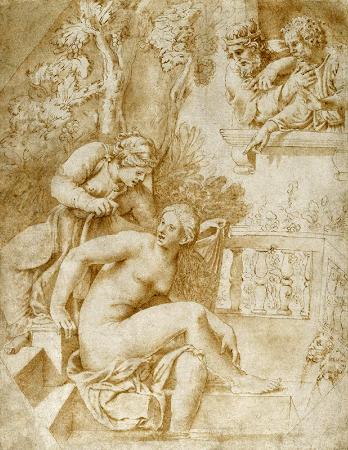Bathsheba. Bathsheba was the wife of Uriah the Hittite and later of David, according to the Hebrew Bible. She is most known for the biblical narrative in which she was summoned by King David, who had seen her bathing and lusted after her. She was the mother of Solomon, who succeeded David as king, making her the Queen mother. Bathsheba was the daughter of Eliam. An Eliam is mentioned in 2 Samuel 23:34 as the son of Ahithophel, who is described as the Gilonite. Bathsheba was the wife of Uriah the Hittite. David's first interactions with Bathsheba are described in 2 Samuel 11, and are omitted in the Books of Chronicles. David, while walking on the roof of his palace, saw a very beautiful woman bathing. He ordered enquiries and found out that she was Bathsheba, wife of Uriah. He desired her and later made her pregnant. In an effort to conceal his sin, David summoned Uriah from the army in the hope that Uriah would have sex with her and think that the child belonged to him. But Uriah was unwilling to violate the ancient kingdom rule applying to warriors in active service. Rather than go home to his own bed, he preferred to remain with the palace troops. After repeated efforts to convince Uriah to have sex with Bathsheba the king gave the order to his general, Joab, that Uriah should be placed on the front lines of the battle, where Uriah would be more likely to die. David had Uriah himself carry the message that led to his death. After Uriah had been killed, David married Bathsheba. David's action was displeasing to the Lord, who sent Nathan the prophet to reprove the king. After relating the parable of the rich man who took away the one little ewe lamb of his poor neighbor, and exciting the king's anger against the unrighteous act, the prophet applied the case directly to David's action with regard to Bathsheba. The king at once confessed his sin and expressed sincere repentance. Bathsheba's first child by David was struck with a severe illness and died, unnamed, a few days after birth, which the king accepted as his punishment. Nathan also noted that David's house would be punished for Uriah's murder. Bathsheba later gave birth to David's son Solomon. In David's old age, Bathsheba, based on David's promise, secured the succession to the throne by Solomon, instead of David's elder surviving sons by his other wives, such as Chileab, Adonijah and others. David's punishment came to pass years later when one of David's much-loved sons, Absalom, led an insurrection that plunged the kingdom into civil war. Moreover, to manifest his claim to be the new king, Absalom had sexual intercourse in public with ten of his father's concubines, which could be considered a direct, tenfold divine retribution for David's taking the woman of another man in secret. John Gill mentions that in Rabbinic literature Bathsheba is supposed to have been the granddaughter of Ahitophel. The argument is that she is called the daughter of Eliam in 2 Sam. 11:3, and 2 Sam 23:34 mentions an Eliam, the son of Ahithophel the Gilonite, one of David's thirty. The assumption is then that these two Eliams are the same person. However in 1 Chronicles the names are very different: Bathsheba is called Bathshua the daughter of Ammiel in 1 Chronicles 3:5. And in the list of David's thirty in 1 Chronicles 11:36 we have Ahijah the Pelonite. Some have also questioned whether Ahithophel would have been old enough to have a granddaughter. Bathsheba was the granddaughter of Ahithophel, David's famous counselor. The Aggadah states that Ahithophel was misled by his knowledge of astrology into believing himself destined to become king of Israel. He therefore induced Absalom to commit an unpardonable crime, which sooner or later would have brought with it, according to Jewish law, the penalty of death; the motive for this advice being to remove Absalom, and thus to make a way for himself to the throne. His astrological information had been, however, misunderstood by him; for in reality it only predicted that his granddaughter, Bathsheba, the daughter of his son Eliam, would become queen. The Midrash portrays the influence of Satan bringing about the sinful relation of David and Bathsheba as follows: Bathsheba was bathing, perhaps behind a screen of wickerwork. Satan is depicted as coming in the disguise of a bird. David, shooting at the bird, strikes the screen, splitting it; thus Bathsheba is revealed in her beauty to David. In, the wife of Uriah is mentioned as one of the ancestors of Jesus. In medieval typology, Bathsheba is recognized as the antetype foreshadowing the role of Ecclesia, the church personified, as David was the antetype for Jesus.
more...













